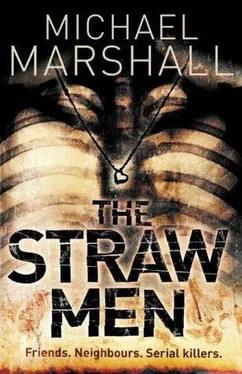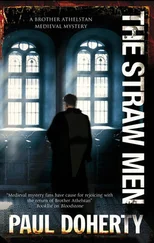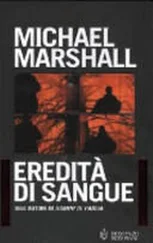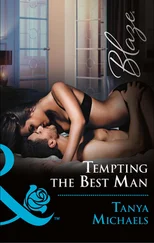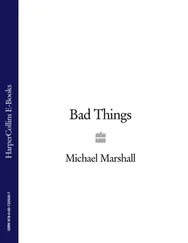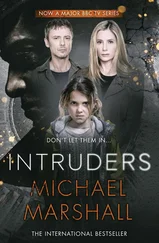Often I think about him, and my mother, two people who are not here any more. Their deaths, like any deaths, are not something that can be made better. You cannot catch death and teach it a lesson, just as you cannot catch unhappiness, or disappointment, and as we have not caught The Upright Man or the group he has come to lead. Perhaps we will someday, perhaps not. Maybe someone like them will always be there. It's impossible to tell right now, just as at the moment I do not know whether the timed destruction of The Halls was merely a wholly successful attempt to destroy all its evidence, or whether the explosion was supposed to trigger the vast pool of molten rock that is gathering force beneath Yellowstone — and so annihilate our culture, and the farms of the Western world, returning us to the way of life that The Straw Men so revere. Returning us, or taking us onwards, into the ruins.
Nina thinks so, from something she heard Davids say: she believes that The Straw Men have convinced themselves that they are the better hunter-gatherers, that their wealth has come from some inner 'purity', rather than fate, that they will prevail in any conditions. I don't know. It's not something I can discuss with anyone now.
The message was delivered to the hotel where I was staying in Los Angeles, the day after Sarah Becker was returned. It was from my brother. I don't know how he found me. An hour later I left the hotel, and I haven't stopped moving since.
The message took the form of a videotape. The first portion had been recorded since I had met him. He was clearly very angry, but had evidently not given up all hope of a rapprochement. He filled me in on some of the time we had not shared. His discovery on the streets of San Francisco, a baby boy with nothing to identify him except a name sewn into his sweater. Foster homes, a first murder. A period about which he was vague. His eventual work as a procurer for the rich and sociopathic, his discovery of a link between his employers and his past, his acceptance within a hidden group and first triumph in a McDonald's in a small town in Pennsylvania in 1991. The move into his own experiments in accelerated evolution through violence and abuse, the plan to create a pure bride with whom to create a non-viral strain. A plan he spoke of with an emotion that sounded unpleasantly like love.
The rest of the video is harder to describe. There is something very disturbing about it, and not just because of its subject matter or the implications of its existence. Seeing what looks like myself, in those positions and doing those things, is like having access into a dark dream world, a place where what I believe myself to be is negated, and I become the person I hope I am not. All Bobby and I ever saw were blurred long shots. The Upright Man, or Paul, as I suppose I should call him, had made sure that there was crystal-clear tape of him at every one of those events. Tape taken by himself. Of him standing, smiling, in burning parking lots, of him laying cables and planting bombs, of him in dark rooms with scapegoats in America, England and Europe, giving them guns and plans. Of him squatting naked over the eviscerated bodies of young people known to be missing. Of him eating things.
And thus, of me doing them. Of me at the top of a towering pyramid of guilt, half an hour of evidence.
Even the tape he sent is no use to me. I can't go to anyone with it, and not just because the police of Dyersburg and probably Montana as a whole have joined the list of people I need to avoid. All the tape does is implicate me. There is no record of me having a twin. There's no record of me at all, except what's on the tape and inside my head.
Before she got out of the car in Santa Monica, Sarah Becker leaned across and said something
quietly to me.
'You have to do it,' she said. 'Only you can kill Nokkon Wud.'
She's right. I can't do anything except what he wants me to do. I can't do anything except go find him.
* * *
In the meantime, as I clock up the miles, keeping on the move, I listen to past voices and think of things that were once done for me, the love that I was given. I don't know the answer to the question of what I've become, and perhaps never will; but I know at least that it is not as bad as it could have been. The note my father left for me, saying they weren't dead, remains true in ways he never intended. They never will be while I am alive. I wish I could have known them better, but like all such wishes its essence is not only that it came too late, but that it would never have been early enough.
The image of them I remember most of all is one I never saw, except through the medium of a television screen. A young couple, both holding pool cues, with their backs to the camera and an arm round each other. And when they turned, how my father grinned, and flipped his finger at the camera, and how my mother stuck her tongue out.
And later, how she danced.
THE END
